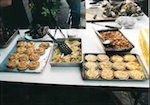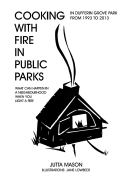Comments?
For the basics, see
- Website & Privacy Policies
- How To Get Involved
- The Role of the Park
Search options:
Department Site Map
Custodians:
An open letter to
Kelly Murphy
Manager of Policy and Development,
City of Toronto Parks and Recreation
September 1, 2022
Dear Ms.Murphy,
This letter is a follow-up to our "ghost oven" display at the Dufferin Grove Park oven, to draw attention to a city permit policy that we feel diminishes our neighbourhoods.
The policy has had the result that outdoor bake ovens built on public land in Toronto are no longer community ovens.
Public ovens in city parks – of which the Dufferin Grove oven, built in 1995, was the first – were meant to be a bit like the common village ovens once existing all over the world. The heat available from a community-sized masonry oven can be available for many kinds of food-making, from the very high temperatures for pizza at the beginning, right on down to food preservation using up the last overnight heat at the end. Communal use is a thrifty way to use wood, and people in a neighbourhood are brought together around food in the open air.
Over the course of about 20 years, community bake ovens, mainly but not only built on parkland, became (to varying degrees) local centres for lively drop-in/ everyone-welcome/ foodways-learning occasions.
Almost all these ovens were built through community fundraising with the help of volunteer labour.
At Dufferin Grove, Christie Pits, Montgomery Inn, and Riverdale Farm, a form of partnership gradually grew between community bakers and city staff. This partnership was strongest at Dufferin Grove, where from 2000 until about 2016, part-time recreation staff worked together with community people to make food and also to maintain the ovens in good repair. Many people came to eat and make friends, and so the oven income (from cheap food at make-your-own-pizza days, to Friday Night Supper, to summer and winter snack bars) covered the costs of materials and labour.
But this kind of staff-community partnership came to be seen as an undesirable anomaly at city hall. In an internal briefing note about ten years ago, city management said that if such partnerships carried on, “the City will be non-compliant on many approved policies, procedures, and legislative requirements… ...vulnerable and open to major risk factors.” The specific details of non-compliance were not shared with the public, but a long process involving many internal meetings began, working to gradually dismantle the “village” part of the oven culture.
This cultural change has now reached the point where the ovens are primarily one-time rentals which fall under the city’s permit system. An individual willing to pay a city permit fee, usually costing around $100 per use, can invite some friends and go and cook their pizza. Wood and food and oven tools are extra, though. The oven will be smoky if the permit-holder is not experienced, and the pizza may be underdone or burned. The experience is daunting enough that most of the time the ovens are unused and locked.
The policy of putting the ovens under the city permit system has led to the following problems:
1. It removes most of the lively everyone-welcome, community-building use of the ovens.
2. Public ovens no longer provide times to learn the use of all the different levels of heat for thrifty food-making with fire (the linked chain of pizzas/ focaccia/ bread/ roasting food/ seasonal harvest preservation/ and finally slow drying). Children as well as adults lose the hands-on experience.
3. While the fire risk of a masonry oven is very low if it’s built a distance from other buildings, the problems of inexperience that come with one-time permitting are considerable. Since the city charges for each time an oven is used, people can’t take the time to practice so they can learn slowly by experience (including mistakes). This includes learning how to use such ovens’ ability to burn wood cleanly.
4. An expansion of interesting work for recreation staff is lost, as is the chance for city staff and citizens to work together and learn from each other.
The city staff/community partnership culture of Toronto Parks and Recreation has shrunk. In the case of the community ovens, we are suggesting that it’s time now to work with us – locally at each oven, not in city hall meeting rooms -- to change this unworkable policy and start the pendulum moving back the other way again.
Sincerely,
- Jutta Mason, project lead on the Dufferin Grove ovens, administrator of the Centre for Local Research Into Public Space (CELOS)
Co-signers:
- Helen Acraman, Sorauren farmers’ market manager (uses Sorauren Park oven)
- Sabina Ali, chair, R.V.Burgess Women’s Committee, lead, Friday bazaar and tandoor oven project
- Lea Ambros, former part-time rec staff and baker at Dufferin Grove (2002 – 2012), originator of Friday Night Supper
- Nigel Dean, oven builder for Dufferin, Riverdale, and Wychwood ovens
- Anne Freeman, Dufferin Grove Farmers’ market manager, 2004-2022, Coordinator of Toronto Farmers’ market network
- Dale Howey, volunteer baker and trainer at Montgomery Inn oven and Regent Park oven
- Shauna Kearns, food security consultant and wood-oven baker at three ovens: Dufferin Grove, Wychwood, and Alexandra Park ovens
- Jane LowBeer, illustrator of Cooking with Fire in Public Parks
- Jane Price, CELOS board member
- Jode Roberts co-chair, Friends of Christie Pits Park, Christie oven lead
- Gene Threndyle, builder of Artscape oven, Dufferin Grove garden volunteer
- Lily Weston, former part-time rec staff at Dufferin Grove (1995 - 2001), started the school pizza-making days






 Printer friendly version
Printer friendly version